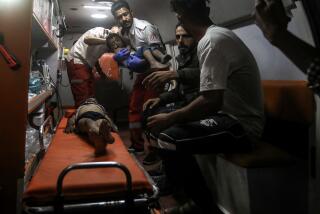Courtrooms Unmask the Terror Within
In America, France and Japan, terrorists responsible for multiple murders of strangers solely to advance political or religious points of view have been brought to justice within the law. The slow grind of courtroom procedures, the painstaking presentations of evidence, the arguments of attorneys, the judicial rulings and the sometimes puzzling verdicts of juries can never be as dramatic as the acts of terrorism; neither do they satisfy a primitive desire for revenge, but they are useful in depoliticizing, demystifying and demythologizing terrorism. Assassinations, which some have advocated, may be an efficient way to kill terrorists; trials are a more effective way of destroying them.
The list of recent trials is impressive testimony to the tenacity of intelligence agents, law enforcement officers and prosecutors, some of whom have spent years tracking down, apprehending and successfully prosecuting the cases against terrorists.
In New York last week, Ramzi Ahmed Yousef was convicted and sentenced to life plus 240 years in prison for his part in the 1993 bombing of the World Trade Center. He had already been convicted of plotting to bring down a dozen U.S. airliners over the Pacific, which would have caused thousands of deaths. With Yousef’s two codefendants also found guilty, every participant in the World Trade Center bombing now is in prison.
In Virginia, a jury convicted and recommended the death sentence for Mir Aimal Kasi for the 1993 murder of two CIA employees.
In Colorado, Timothy McVeigh was found guilty of using a weapon of mass destruction to kill 168 men, women and children in the Alfred P. Murrah Federal Building in Oklahoma City. In a separate trial concluded last week, Terry Nichols was convicted for his part in helping McVeigh.
In France, the notorious terrorist Carlos, indirectly responsible for scores of deaths, was found directly responsible for three murders and sentenced to life in prison.
In Japan, trials continue of Shoko Asahara and fellow cult members accused of releasing nerve gas in Tokyo’s subway, among other crimes.
Theodore Kaczynski, on trial as the so-called Unabomber, wrapped himself in a political cause and wrote of himself as a terrorist, although most would put him in the category of mad bomber. His lawyers want to plead insanity; he objects.
As terrorists, these people had unenviable lives--isolated, on the run, always in fear, able to trust no one, ultimately betrayed. Their lives now are bleaker still. No blaze of glory. No Armageddon. No martyrdom. No army of acolytes. Society grants them some rights, but they remain subject to the indignities of all prisoners. Once men who commanded fear, they are now told when they may sit, stand or speak and are watched even in their sleep. This is perhaps the terrorists’ worst fate: to spend rest of their lives being treated as ordinary criminals.
From the time they are apprehended, they appear not as master villains, but are revealed to be ordinary mortal beings, albeit of a particularly nasty sort. We learn that they were teased about being fat, bullied or abused, that they were easily disillusioned dropouts, washouts, misfits, drifters, pretenders, blaming others for society’s ills and their own misfortunes, emotionally flat, attention-craving sociopaths, chilling in their banality.
Curiously ambivalent as defendants, they boasted or threatened or slumped in silence, but accepted no responsibility for their actions. No Patrick Henrys here. Instead they complained that they were unfairly apprehended, that they were the victims of dark conspiracies or the dupes of others. To the end, they are unrepentant. There is no hint of remorse.
Beyond carnage, their achievements are meager: No governments overthrown, no injustices remedied, no Satans brought to their knees, no lasting legends. The death toll for which they are responsible is tragic, but measured against the world volume of armed conflict and violent crime, it represents no more than a small bloodstain on the pages of history.
We listened in vain for a cogent argument, a compelling reason to explain the violence. What we heard was a rambling, often incoherent and unpersuasive mishmash of political pretensions, conspiracy theories, personal grievances, vague references to the international revolutionary movement (whatever that means), hatred of America or capitalism and lust for a high body count. How the bombs and the bodies would contribute to the ultimate objective, if there was one, never was clear. All of these recent defendants typify the later generation of terrorists for whom terrorism became its own ideology.
Terrorism is violence calculated to create an atmosphere of fear and alarm that in turn will cause people to exaggerate the strength of the terrorists and the importance of their causes. Their evasion of capture heightens public frustration and tempts some to argue that to effectively combat terrorism, we must adopt the tactics of the terrorists. The recent courtroom successes argue otherwise. These trials not only demonstrate the power of justice; they also provide the opportunity to unmask the terrorists, deflate the terror and teach a civics lesson besides: We rightly win. We win right.
More to Read
Start your day right
Sign up for Essential California for news, features and recommendations from the L.A. Times and beyond in your inbox six days a week.
You may occasionally receive promotional content from the Los Angeles Times.






